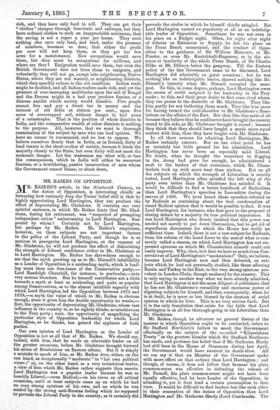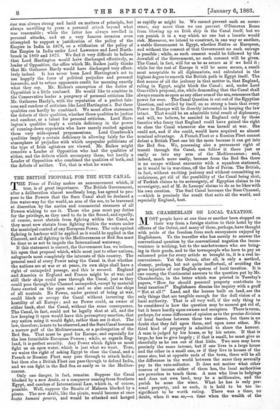MR. RAIKES ON OPPOSITION.
MR. RAIKES'S article, in the Nineteenth Century, on the duties of Opposition, is interesting chiefly as betraying how curiously deep the Tories' belief still is that by highly appreciating Lord Hartington, they can produce the effect of depreciating Mr. -Gladstone. It contains one very spiteful sentence, in which Mr. Raikes hints that Mr. Glad- stone, during his retirement, was "suspected of prompting independent action" embarrassing to Lord Hartington. Sus- pected by whom ? Certainly not by Lord Hartington, but perhaps by Mr. Raikes. Mr. Raikes's suspicions, however, on these subjects are not important factors in the policy of the Liberal Party, and though he is so anxious to panegyrise Lord Hartington, at the expense of Mr. Gladstone, he will not produce the effect of diminishing the strength of Liberal confidence either in Mr. Gladstone or in Lord Hartington. Mr. Raikes has shrewdness enough to see that the myth growing up as to Mr. Disraeli's infallibility as a Leader of Opposition is a misleading myth, which is lead- ing more than one free-lance of the Conservative party,-- Lord Randolph Churchill, for instance, in particular,—into very serious blunders. But he himself contributes not a little towards a myth at least as misleading, and quite as popular among Conservatives, as to the almost infallible sagacity with which Lord Hartington led the Opposition between 1875 and 1878,—a myth the value of which to Mr. Raikes is obvious enough, since it gives him the double opportunity he wants,— first, the opportunity of depreciating Mr. Gladstone, whose vast influence in the country is, as he rightly thinks, so mischievous to the Tory party ; next, the opportunity of magnifying the particular style of Opposition leadership for which Lord Harington, as he thinks, has gained the applause of both parties.
Our own opinion of Lord Hartington as the Leader of Opposition is not at all that of Mr. Raikes. We should say, indeed, with him, that he made an admirable leader on all the greater occasions, before Mr. Gladstone brought forward his series of Resolutions on Eastern affairs. But it is simply a mistake to speak of him, as Mr. Raikes does, either, on the one hand, as exceptionally " moderate " in "his own political views ;" or, on the other hand, as a very industrious leader, a view of him which Mr. Raikes rather suggests than asserts. Lord Hartington was a popular leader because he was so heartily Liberal,—even Radical,—in his views on all critical occasions, until at least subjects came up on which he had no very strong opinions Of his own, and on which he was misled by the strong anti-Russian feeling which he supposed to pervade the Liberal Party in the country, as it certainly did pervade the circles in which he himself chiefly mingled. But Lord Harlington earned no popularity at all as an indefatig- able leader of Opposition. Sometimes he was not even in his place on a Budget night. Often, for night after night of debates on Estimates or Supply, he left his place on the Front Bench unoccupied, and the conduct of Oppo- sition to the guidance of Sir William Harcourt, or Mr. Forster, or even Mr. Knatehbull-Hugessen, or in the ab- sence or inactivity of the- whole Front Bench, of Sir Charles Mike or Mr. Dillwyn below the gangway. Till the Eastern policy of the late Government came to be discussed, Lord Hartington did admirably on great occasions ; but he was nothing like an indefatigable leader, showed nothing like Mr. Disraeli's tenacity when Mr. Disraeli occupied the same post. To this, in some degree, perhaps, Lord Hartington owes the excess of credit assigned to his leadership in the Tory ranks ; to this, and their great desire to find some rival whom they can praise to the discredit of Mr. Gladstone. They like him partly for not bothering them much. They like him more for having turned the cold-shoulder to Mr. Gladstone's Reso- lutions on the affairs of the East. But they like him most of all because they believe that he could never have brought the country round to his side, as Mr. Gladstone brought it round ; because they think that they should have fought a much more equal• contest with him, than they have fought with Mr. Gladstone.
In all these reasons for admiring Lord Hartington, Mr. Raikes certainly concurs. But on one other point he has as certainly but little ground for his admiration. Lord Hartington has never been an especially mild Liberal. No doubt, when he thought the resistance to flogging in the Army had gone far enough, he administered a snub to the leaders of that resistance, which Mr. Cham- berlain took up with more heat than wisdom. But on all the subjects on which the strength of Liberalism is usually tested, Lord Hartington often satisfied the left wing of the party even better than Mr. Gladstone has satisfied it. It would be difficult to find a better handbook of Radicalism than Lord Hartington's speeches in Lancashire during the canvas of 1880. We have heard these speeches referred to by Radicals as containing about the best condensation of sound Radical opinion that it would be possible to find. It was Lord Hartington, for instance, who first gave to the proposal of closing debate by a majority its true political importance. It was Lord Hartington who firmly insisted that this power was needed not merely to put down Obstruction, but to get rid of superfluous discussions for which the House has really no sufficient time. Indeed, there is not a test-subject for Radicals, from the reform of the Land Laws to the uses of what is com- monly called a caucus, on which Lord Hartington has not ex- pressed opinions on which Mr. Chamberlain himself could not easily improve. Why, then, is it that we hear so much from Con- servatives of Lord Hartington's " moderation ?" Only, we believe, because Lord -Hartington now and then deferred, on sub- jects which he had not personally studied, like those affecting Russia and Turkey in the East, to the very strong opinions pre- valent in London Clubs, though nnshared by the country. This is only saying in another way what we have already admitted, that Lord Hartington is not the most diligent of politicians, that he has not Mr. Gladstone's versatility and enormous power of digesting subjects for himself, and that, consequently, when he is at fault, he is more or less biassed by the stratum of social opinion in which he lives. This is no very serious fault. But it is the only foundation that exists for the fable that Lord Hartington is at all less thorough-going in his Liberalism than Mr. Gladstone.
Mr. Raikes, though he advances no general theory of the manner in which Opposition ought to be conducted, refers to Sir Stafford Northcote's failure to assail the Government effectually on the subject of the so-called " Kilmainham Treaty" as the greatest blunder which Sir Stafford Northcote has made, and professes his belief that if Mr. Gathorne Hardy had still been in the House of Commons daring last April, the Government would have received its death-blow. All we can say is that no Member of the Government spoke with more effect on that subject than Lord Hartington ; and though, of course, it does not follow that because his plain common-sense was effective in defending the release of Mr. Parnell, his plain common-sense might not have been equally effective, had he been Leader of the Opposition, in attacking it, yet it does lend a certain presumption to that view. It would be difficult to find leaders less like each other in their conception of the duties of Opposition than Lord Hartington and :Mr. Gathorne Hardy (Lord Cranbrook). The one was always strong and lucid on matters of principle, but always unwilling to press a personal attack beyond what was reasonable ; while the latter has always revelled in personal attacks, and on a very famous occasion even attempted to support a justification of the policy of the Empire in India in 1878, on a vilification of the policy of the Empire in India under Lord Lawrence and Lord North- brook in 1869 and 1873. We find it very difficult to believe that Lord Hartington would have discharged effectively, as leader of Opposition, the office which Mr. Raikes justly thinks that Kr. Gathorne Hardy would have discharged very effect- ively indeed. It has never been Lord Hartington's art to use happily the force of political prejudice and personal innuendo, and to refuse • opponents credit for meaning exactly what they say. Mr. Raikes's conception of the duties of Opposition is a little confused. He would like to combine in the Conservative leader a pungency of personal criticism like Mr. Gathorne Hardy's, with the reputation of a perfect fair- ness and candour of criticism like Lord Hartington's. But these qualities can hardly be combined. We must allow statesmen the defects of their qualities, whether those qualities be justice and candour, or a talent for personal criticism. Lord Hart- ington's qualities imply a certain deficiency in the power of running-down opponents who have merely excited against them very wide-spread prepossessions. Lord Cranbrook's qualities imply a certain deficiency in allowing fairly for the atmosphere of prejudice with which unpopular politicians of the type of Irish agitators are viewed. Mr. Raikes might conceive a Leader of Opposition who had the qualities of either, and the defects which accompany them, but hardly a Leader of Opposition who combined the qualities of both, and the defects of neither. Yet, that is what he wants.















































 Previous page
Previous page